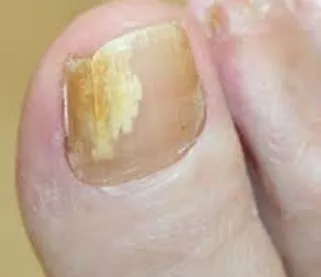Fungal Nails
Fungal Nail Infections
Fungal nails or onychomycosis is a common condition that can affect the toenails of the feet. The condition can leave the nail looking thickened, misshapen and crumbly and often turns the nails a yellowy brown colour. If untreated the fungus can eventually effect the whole nail and result in painful nails.
It is important to have the nail assessed as there are several other conditions that can effect the nail that require different treatments to fungal nails. Whilst the condition is a stubborn one to treat there are several treatment options available including topical and oral medication and we discuss which ones are the best fit for you.


How do I know if I have a fungal nail infection?
Fungal nails can be hard to pick and are often misdiagnosed. Common signs of a fungal nail infection are yellow, orange and white discolouring on the surface or through the nails. Thickening and changing shape of the nails can also be an indicator of nail fungus.
Tests can be performed to formally diagnose the condition but unfortunately they are often not entirely accurate. Due to the unreliability of lab testing it is often better to rely on someone with large clinical experience to make a diagnosis for you.
How can my fungal nail infection be treated?
There are three main treatment options available to treat fungal nails these are
- Topical ointments like Lamisil, daktarin or Canesten can be bought from chemist and applied routinely as per their instructions. Alternately homeopathic options can be used like tea tree oil or white vinegar. These treatments are normally your cheapest option but their success rate is quite low some studies often suggest anywhere from 6-34%. They also require daily application for 6-15 months.
- Oral medication like terbinafine. Tablets like these need to be prescribed through a GP and are only available through PBS funding if a positive fungal culture has been grown from a nail sample. Normally 2-3×6 week courses are required. These tablets work quite well and quickly especially when compared to topical treatment their biggest down side is the tablet place strain on the kidneys and liver to process them and often cause gastrointestinal distress. For this reason doctors are often reluctant to prescribe them.
- Laser therapy can be used to treat nail fungus it work by firing light frequencies at the affected nail that can kill the nail fungus. Beware though not all lasers are created equal and vary enormously in quality and their outcome. At Hurst Podiatry we use a K laser these are a class 4 laser and the most powerful and effective lasers on the market. Treatment normally involves 5 appointments one week apart to kill the fungus. After this the nail will grow out slowly over time and should return to its previous appearance. You can see more information on our K laser page on how K lasers work.
How long will my fungal nail infection take to get better?
This depends mainly on which treatment you choose to use laser therapy will normally be the fastest(3-6 months) followed by oral medication (4-8 months) and topical ointment (6-15 months).
How much will treatment cost?
This again varies depending on the therapy you choose.
- Topical treatments normally cost $40-$100 dollars
- Oral medication If not funded through the PBS tablets can cost around 100 for a 6 week cycle and you will require around 2-3 lots. If PBS funded this price can often come down to around $40 dollars per script
- Laser therapy at our clinic is $39 per session plus your consult fee five sessions is normally required with occasional extra sessions required several months later in severe cases
